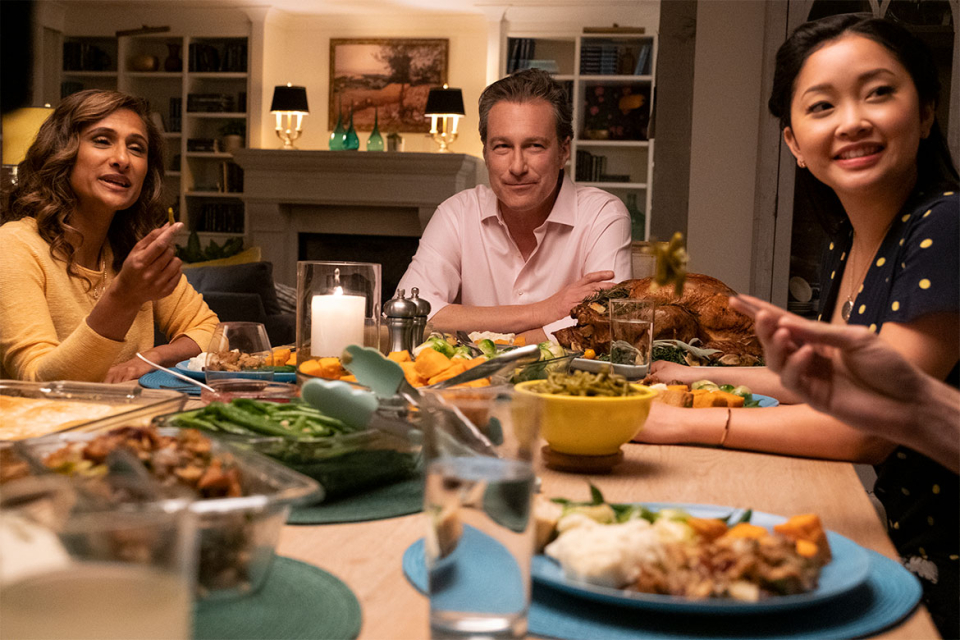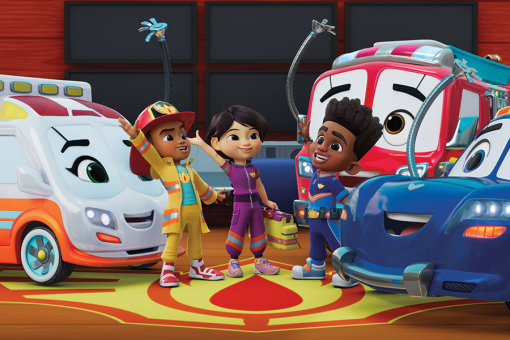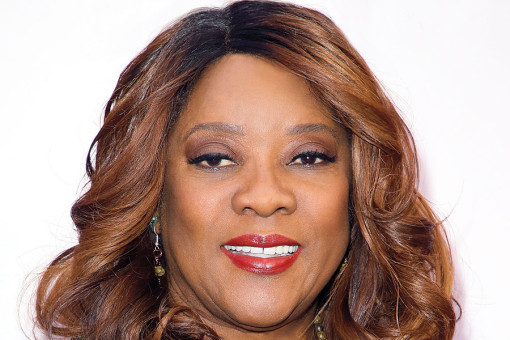Netflix's To All the Boys trilogy follows Lara Jean Covey (Lana Condor) and Peter Kavinsky (Noah Centineo) as they fall in love and navigate their burgeoning high school romance.
But what sets the movies apart is that it also spends time with the adult characters in Lara and Peter's world. The parents and parental figures aren't disinterested or never seen stereotypes but instead caring and invested adults.
This is exceedingly clear with Trina, the neighbor Lara Jean's father starts dating in the second movie. Trina, as played by Sarayu Blue, is a supportive adult female presence in the movies based on the novels by Jenny Han.
"I love that when you are introduced to Trina she's not this desperate woman just looking to find a man," Blue says. "Both Dr. Covey and Trina are hesitant to begin this relationship. They're both going into this relationship as adults and I think it's really great that Lara Jean watches that journey because she's going through that journey in young love."
In addition to the To All the Boys movies, you may know Blue from her headlining role in the NBC comedy I Feel Bad, the Netflix spoof Medical Police and the TNT drama Monday Mornings. Along the way she's had guest staring arcs on series including CBS' The Unicorn and even voiced a character on the animated children's series Mira, Royal Detective.
TelevisionAcademy.com recently had the opportunity to talk to the Madison, Wisconsin native about her varied career, what's coming up next for her and how she sees the television landscape changing.
You joined the To All the Boys franchise in the second movie. What was that experience like?
Sarayu Blue: It was so truly wonderful and I say that because to join a world that has already been built can feel intimidating. There's a history that's already been created. This group was so warm and welcoming and fun since the beginning and that energy has stayed consistent. They've become true friends of mine that we continue to text with and zoom with.
Your character Trina really rejects the "evil step-mother" trope.
Gosh I love Trina. Here's this woman who is divorced. She doesn't have kids and she still got a lot of joy and joie de vivre and nuance. And often you don't often see that with female characters and I think the way [author and executive producer] Jenny Han created her, you really get to see that with Trina. And I think that's so special and important to see these kind of dimensional female characters.
It means so much to me to see that kind of dimension. I talk about this a lot too – women of color getting to play dimensional characters which I don't think happens enough. It's getting better all the time but I want more and more of it. I crave it. It's such a gift to play a role like Trina who is so dimensional and complicated and interesting.
Trina is such a supportive presence in the girls' lives.
The female dynamics are really nuanced, believable, complex and they're not feeding into this idea of catty girls and pettiness and sort of keeping each other down.
This world is really about women supporting women on every level—you just see it across the board and I love that through line. I think that message is so important. This is the kind of stuff you get with female writers. I'm not saying male writers can't do it but female writers they're bringing their personal experiences, and guess what, we're actually really loving and supportive of one another.
The movies really speak to all generations but To All the Boys is truly poised to become an iconic teen franchise, one that I think teens will be watching for years to come.
After I watched the third one I was just weeping. I couldn't stop crying tears of joy. For kids to grow up with not just this level of representation but these messages saying women's needs are important. Women's feelings are important. Women's journeys are important. Lara Jean's desire to go to New York shouldn't be hampered by her love for Peter.
That's enormous compared to John Hughes movies where girls are giving their underwear to boys. This is a big big change. I think we have so far to go personally and I'm so grateful for where we are and it's really meaningful to see this.
You also got to go on location and film in Seoul, Korea.
It was incredible. My husband was able to come with me which was really special. I think we fell madly in love with Seoul. We really loved that city. I miss the food so much. It was the best trip of our lives. We had so much fun. It was pre-pandemic in the fall of 2019. We were lucky we were able to get it in when we did.
You are currently working on the upcoming AppleTV+ dark comedy The Shrink Next Door. You are someone who has been able to do both comedy and drama.
I'm so glad there is more of a blending in terms of comedy and drama and I think a lot of that is with streaming, with cable and all of these other opportunities opening up for storytelling and what comes along with that is a whole new different kind of storytelling. You'll see a lot of comedies that are quite heartfelt and a lot of dramas have comedy in them.
I think there there's been a lot of crossover storytelling wise and why actors are able to go back and forth.
What do you think has allowed you to be successful in both comedies and dramas?
When I was first in the business coming up there were not many South Asian roles and there was a need for South Asians every once in a while in both comedy and drama. So the fact that I had the opportunity to do both also came down to the fact that there were so few opportunities and they just needed someone.
I think it's exciting to see how diversity is really opening up When you have great writing it's easy to be funny, it's easy to be serious, it's easy to do all of it. It's just storytelling.
Do you think the increase in streaming platforms has led to more diversity in television?
In my honest option, it has to be much more intentional than that. I think a lot of people inadvertently look at numbers when they say diversity. Actors from under represented communities need to be in the kind of roles that get attention because that's what really moves careers forward.
What happens too often is that people from under represented communities kind of get put into side roles and you would look at that percentage-wise or numerically and say well there's diversity. But what I always say is it's not inclusivity. Inclusivity is setting all these people up to thrive, to move careers forward and so the platform is helpful.
But what's really helpful is people being really intentional around where they put their attention, how they cast, how they set up their writer's rooms, hire diverse crews, how they are supporting people from these communities.
You contacting me and saying let's do this interview, that's visibility and so those kind of things happening more and more is what really starts to change the game and it's exciting because it is happening and I'm so so so excited to see where we really go.
In 2018, you starred in the NBC comedy I Feel Bad. Unfortunately the show was cancelled after 13 episodes. How do you deal with the ebbs and flows, ups and downs of the business?
I mean therapy and I make no bones about it therapy, therapy, therapy. I Feel Bad was a real grieving process for me. I don't always go through that – sometimes you think, well that's the business. The stars align how they align and there's nothing you can do.
Every once in a while you get an opportunity like that and that was enormous. I was only the second South Asian woman to ever carry a network comedy at that time. I think we were one of first shows to ever show an Indian family. We had a South Asian American showrunner. So that show meant so much to me. So the grieving process was very real.
One of the things I've really worked on is not getting myself warped from the industry. Knowing whether I'm working or not, whatever is going on on the outside, my integrity is intact, taking care of myself, supporting myself whether it's through therapy, good friends, whatever it is I always keep those things in place for me because ultimately if we are always looking to the external to feel good about ourselves
it's a tough thing. I don't know if it gets easier. The heartache is the heartache. But one of the things I learned how to do is just find a strong support system to help weather those storms for me that's what has been able to give me the longevity really.
You are also working on writing a few projects?
My mom is short story writer so it's in my blood. I bow down to writers who do this for their careers, it is a very real skill. It's not something I think I can just pick up and do but I'm trying.
I was developing something last year and am now in the process of developing something else which I'm really really excited about. Ultimately I'm always looking for ways to create more work and more opportunities for South Asians in film and television.
I really want to create the kind of work that shows who we are and shows us in our multi-dimensional faceted ways. I think that's always the most important type of representation. Human representation. That's something I'm really passionate about. There's a different understanding when a South Asian has written a South Asian I think there's a way into their world.
There's a perspective that I can give. I'm trying to develop that. I think it will be a really exciting and original way into the South Asian experience.













